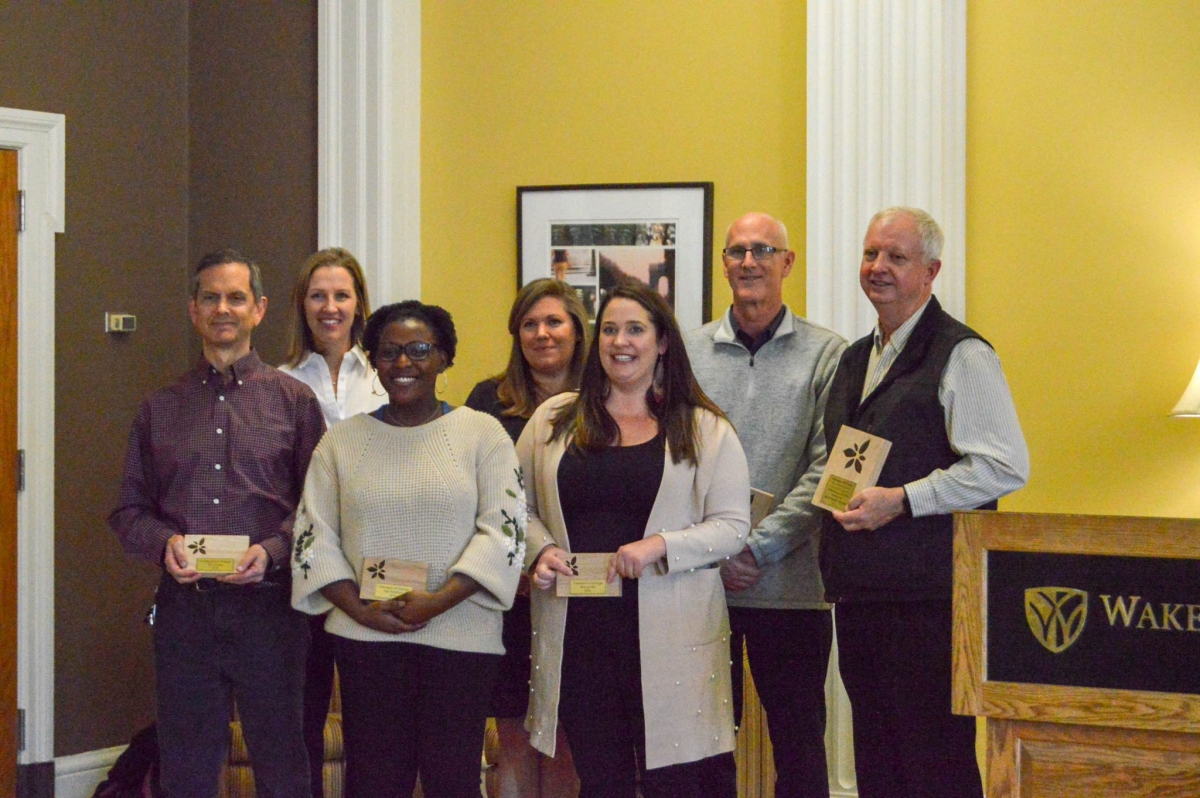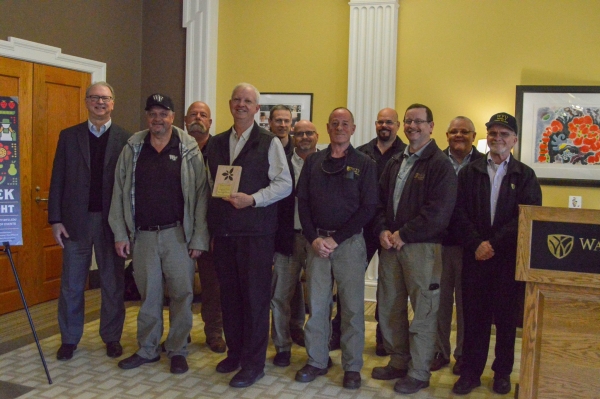Eight Campus Leaders Recognized at Sixth Annual Campus Sustainability Awards

Over 70 students, faculty and staff gathered on Monday, April 1 to celebrate the start of Earth Week 2019 and recognize those who have gone above and beyond in their efforts to impact campus sustainability. Wake Forest University Provost Rogan Kersh and Executive Vice President Hof Milam presented awards to four students, faculty and staff who exceeded the criteria in the four awards categories: Teaching, Research and Engagement; Resource Conservation; Service and Social Action; and Bright Ideas.
The 2019 Academics, Research, and Engagement award went to Dr. Abdou Lachgar from the department of Chemistry. In the lab, Dr. Lachgar has developed a catalyst that converts waste feedstocks, like dirty cooking oil, into Advanced Biofuels. He has collaborated with universities across the world on biofuel and biochar research and development. Through his most recent collaboration, his team has developed a new environmentally benign process to convert carbons from used tires into an energy source. He has also secured funding for a biofuels processor that was installed at the Winston-Salem Forsyth County Career Center where it is used by high school students in their renewable energy technologies course.

The Maintenance and Utilities Services Team, led by Mike Draughn, was presented with this year’s Resource Conservation award. This team has worked tirelessly to capture energy efficiency across campus and to translate that work into a greenhouse gas reduction plan. From a 2007 baseline, the team has cataloged a 30% reduction in absolute greenhouse gas emissions to date. Draughn has led the team in developing forecasts and plans for reaching a total 45% reduction by 2027. Coupled with the potential for solar installations on campus, the university should be able to reach a whopping 50% reduction in greenhouse gas emissions by the target date.
The Service and Social Action award was presented to professor of Divinity in the Food, Faith, Health and Ecological Well-Being Program, Dr. Mark Jensen. Dr. Jensen has devoted his career to teaching and engaged learning aimed at transforming communal well-being. He has also cultivated an ongoing partnership with the AMOS project in Nicaragua, taking students to Nicaragua to learn about health and ecological challenges in rural parts of the country. Mark has served on countless community committees and advisory boards, networking with local leaders on issues related to health and sustainability.
Executive Director of Donor Experience for University Advancement, Emily Smith received this year’s Bright Ideas award for her idea that quite literally illuminated our campus: reusable Lovefeast luminaries. Smith led her colleagues in the charge to invest in nearly 4,000 durable, reusable luminaries that could be stored and used for years to come. This shift from paper luminaries with battery-operated tea lights to sturdy, reusable luminaries with LED lights and electrical timing capabilities both reduced waste and saved energy.
Champions of Change – Everyday Leadership
Four additional awards were presented to four campus leaders who create change and impact sustainability through their everyday efforts.
As the Green Team captain for University Advancement’s Alumni & Donor Services, Morey Graham has led the charge in Advancement’s waste diversion efforts. Along with her fellow Green Team captains in Advancement, Morey created a presentation titled “’Can I Compost My Gingerbread House?’ and Other Frequently Asked Questions,” which included “how-to” guides, information on recycling and organics collection, community resources for sustainability, current initiatives on campus, and ways to get involved.
Kat Pitchford is a Compost Crew shift leader, an integral part of the Plant-Forward Dining Committee, a member of the newly-formed Fashion & Sustainability steering committee, and — in their spare time — an RA who leads their residents in sustainability education and outreach activities. Kat has selflessly volunteered dozens of hours of their time to sustainability efforts on campus, and has done so without ever seeking reward or recognition.
Tim Covey has instituted various waste diversion initiatives in the UCC and spearheaded Information System’s organics collection program. In order to get the program off the ground, Tim personally drove his department’s organic waste from the UCC to campus for proper disposal. Thanks to Tim, the program has grown, and IS now has multiple collection sites in the UCC and a permanent drop-off location for organics at their loading dock.
Brooke Orr is committed to educating students, faculty, and staff on the benefits of healthy eating, both for individuals and for the environment. In addition to promoting performance dining, allergen awareness, and eating disorder education, she has been one of the driving forces behind Wake Forest’s plant-forward dining initiatives and student-centered efforts like the Plant-Forward Dining Committee. She has mastered the art of collaboration and her Gold Apron events provide fun and interactive opportunities each week for students, faculty, and staff.
Congratulations to all of our Champions of Change for all that they do to make Wake Forest a more sustainable place to work, live, and play.
